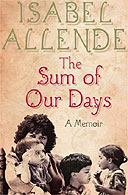 Allende’s novels have been translated from Spanish into over 30 languages and sold in more than 56 million copies. There are three movies based on her novels currently in production — Aphrodite, Eva Luna and Gift for a Sweetheart.
Allende’s novels have been translated from Spanish into over 30 languages and sold in more than 56 million copies. There are three movies based on her novels currently in production — Aphrodite, Eva Luna and Gift for a Sweetheart.
Most recent works: a novel set in New Orleans was published in 2010, The Island Beneath the Sea; in 2011 came El Cuaderno de Maya (“Maya’s Notebook”), a novel in which the setting alternates between Berkeley, California, and Chiloe in Chile.
Her 2008 book, The Sum of Our Days is a memoir. It focuses on her recent life with her immediate family, which includes her grown son, Nicolás; second husband, lawyer and writer William Gordon, as well as her grandchildren.
Isabel Allende has recently become one of my favourite writers. Because she writes only in Spanish although bilingual, and I strive to read in original, as I believe that “traduttore traditore” (translator traitor), I have been toiling with Inés del Alma Mía (Inés of My Soul) for quite some time, the inconvenience of needing a Spanish dictionary still a bother. I found the audio format of The Sum of Our Days at the library and took it, reluctantly breaking my rule halfway: had I found it in Spanish I would have definitely listened to it in Spanish…
There are so many words I want to pour on paper talking about Isabel’s work, her beliefs, and her way of life. The Sum of Our Days is all that: a beautiful narration of a period of time in Isabel’s life, with happiness and sadness, right or wrong, friends, family, and what she calls or rather what her husband calls “her tribe”.
The main character is of course, Isabel. We learn about her passion for life, kindness, justice… she is a lioness when it comes to her family, she is writing the book in a period when she is recovering after her daughter’s death, a misfortunate accident that could have been avoided. I find her story enchanting. I recognise myself here and there and I am grateful for the advice that she directly or indirectly gives. She is real and one gets to admire and appreciate that. You can tell she is enjoying being a mother and a grandmother, her life as it is, minus the loss of her daughter.
There is a funny mark that Isabel tries to keep, and that mark overtakes the sorrow even when the situation is extremely serious: she is given a baby girl in India by a group of women who then run away, for “who wants a girl”; she does not want to hurt her husband’s feelings and is hilarious not trying to discourage him from publishing his first book about a kinky dwarf; she postpones taking her husband to a doctor when he could be dying, just so she can shop more during the trip; she brings racism and cultural differences into focus with an amusing candor and you cannot help but laughing when she is trying to tell an Asian woman who does not speak English that she should hit her husband hard in the head with the frying pan if he is trying to abuse her(the husband in question being Isabel’ family’s friend and accountant of decades)…
Towards the end you can feel that Isabel is planning to finish the book, and is somehow embarrassed not to have anything dramatic or out of the ordinary to produce for a big finale, because she is writing about her life, which, of course is not over. You cannot blame the hurried “ok, that’s it, nothing else to say folks, sorry about that” wrap up, you are happy there will be more books out there written by her for you to enjoy.
If you wish to purchase this book from Amazon and support allwords.ca at no extra cost to you please click on the link below.
